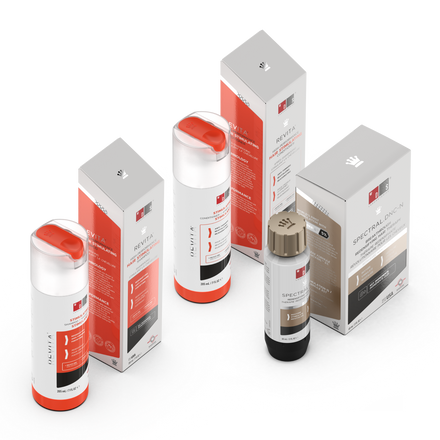Diet and Supplements
One of the simplest ways you can prevent hair loss is to eat a healthy, wholesome diet. For hair to grow, your body requires key nutrients from the food you eat. People who are deficient in certain vitamins, minerals, and protein (such as people with eating disorders) will struggle with hair loss. Because our diet is something that most of us can control, this is a great place to start when you are struggling with hair loss. Start by ensuring that you are getting a sufficient intake of the following nutrients:
- Protein - Hair is made up of proteins like keratin. Making sure you have plenty of protein in your diet can help lengthen the anagen (or growth) phase of the hair growth cycle and keeps your hair healthy and strong.
- Vitamins A, B, C, D, and E - Vitamins serve numerous roles in the human body, and many of them are involved in cellular growth and development, inlcuding in the hair follicles. For example, vitamin A has retinoids, which boost hair growth. This vitamin group may also play a beneficial role in sebum production, which is essential for your scalp health.
- Biotin - Also called vitamin H, biotin is a water-soluble vitamin that helps convert food into energy. Biotin deficiencies have been linked to poor skin and hair health, so many people take biotin supplements to increase their hair thickness and length.
- Iron - This mineral is vital because it helps oxygen bind to blood and carries it throughout our bodies. Having plenty of iron means that your hair follicles can get the oxygen they need to grow more quickly and lengthen the hair growth cycle.
- Zinc - People with a zinc deficiency often experience hair loss. This mineral is essential for cellular growth and tissue repair, including your hair follicles.
These essential nutrients for hair health can all be found in fruits, vegetables, meat, nuts, and seeds. Many people aiming for whole-body health (including hair health) adopt the Mediterranean diet because it is rich in fish, lean proteins, vegetables, nuts, plant oils, and fruit.
For people concerned that their diet is insufficient to support hair growth (or for those looking for extra nutritional support), dietary supplements specifically designed for hair health can be powerful. For example, the Revita Nutraceutical Tablets from DS Laboratories contains all of the essential nutrients you need to combat hair loss of all types (including male and female-pattern baldness and telogen effluvium).










